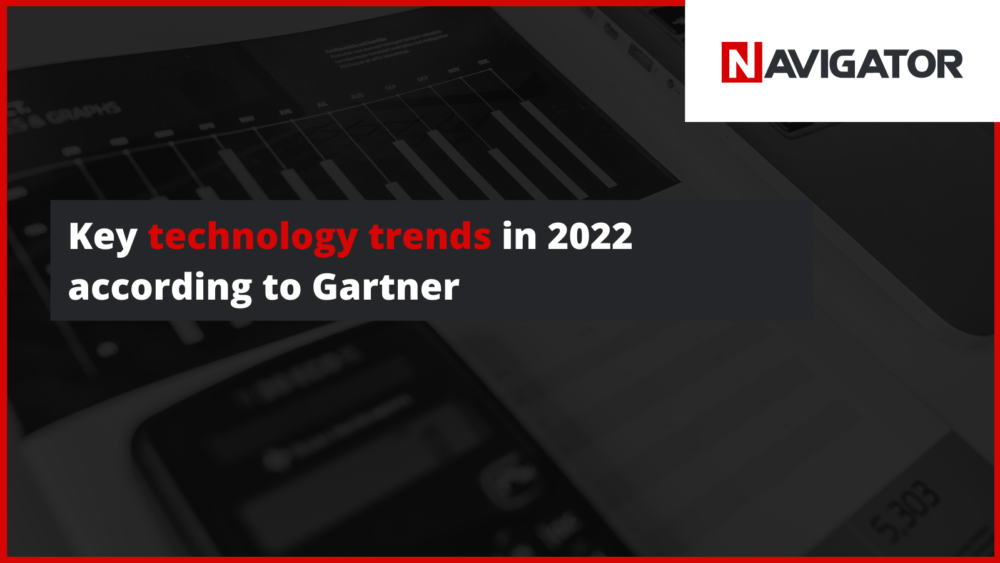Changes are necessary when it comes to development of any business market, especially IT.
Gartner company once again conducted the analysis of technological sector, forecasting incoming evolution in the current trends. The trends tend to shift as the IT industry changes rapidly. Trends considered up to date a week ago might be already out of date tomorrow.Every year new technologies are developed based on the business needs, when Industry 4.0 is using countless technological solutions, programmed and created by IT sector. Multidimensionality and versatility of informatic systems are a key factor in both modern world and the process of business development. The analysts from Gartner came up with 12 strategic technology trends for 2022. Can we expect anything new?
Data Fabric
The right Data is the key in proper business functioning. The colossal amount of processed information forces us to find access to valuable sources quickly and systematically. New methods of creating networks like Data Fabric are emerging based on cross-platform access to integrated data sources, where users can share and manage information among business processes. Workload related to data processing and analysis is greatly reduced by self-learning processes and future recommendations, thanks to prior data.
Cybersecurity mesh
Nowadays, we observe the growing importance of cybersecurity as a method to prevent and counteract against any threats. It is an important element of business activity in almost any industry. The development of security solutions, which are using elastic and composable architecture allows to increase cybersecurity. Improvement of security overall, protection of key resources, as well as verification of data and system compatibility are crucial as todays technological trends.
Privacy-Enhancing computation
Legal aspects regarding personal data management are another important factor in business. The trend related to private data security is on the rise. The response for increasing social worries and anxieties about their information, are privacy-enhancing computations. Various methods of private data protection also mean respecting of law and compliance requirements. The migration of data to cloud, identity of third parties, business digitalization and remote work organization are more and more relevant aspects in operation of business these days.
Cloud-Native Platforms
The solutions based on cloud architecture are steadily becoming a default way of working. No need to install software on the server is a popular choice today due to its high flexibility and reduced server maintenance costs Cloud-native platforms are tools that lets to create new software architecture in cloud or move the existing data to cloud by using the “lift-and-shift” technology. It also helps to react spontaneously to any environment changes.
Composable Applications
Composable applications are delivering functionalities for businesses based on modular components, what leads to code reusability and reducing the time of programming and implementing of new solutions. Customers are often looking for quick and simple tools, which is exactly what composable applications are for. The project realization, where time of implementation is crucial, creates perfect conditions for composable applications, where everybody can rebuild them and adjust them to the needs of project tea or the whole organization.
Decision Intelligence
Each day, every corporation makes plenty of business decisions. This trend related to decision intelligence is a form of practical approach to improve the way of making choices in a company, by modelling processes with the usage of artificial intelligence and self-learning processes. Based on previous workflows and decisions made, decision intelligence helps employees to make correct choices. Automation of decision-making process works by conducting a simulation, analyzing data gathered awith artificial intelligence.
Hyperautomation
It’s the trend that have been appearing in Gartner’s lists for several years. Hyperautomation is about using artificial intelligence, automation and Business Intelligence software in a complex manner, with a goal to arrange digital transformation of the company. It allows scalability, remote access and the change of entire business model. Utilization of this trend is the most visible in modern, fast developing automation platforms.
AI Engineering
This tendency just like the previous one, isn’t mentioned for the first time by Gartner. Especially in last couple of years the expansion of artificial intelligence industry started growing even faster. There is a plenty of tasks performed by machines instead of humans these days. The only problem is to manage, project and develop them smartly, so they could actually offer real business value. That’s why it is worth to consider new “Turnkey Solutions” that are appearing on the market.
Distributed Enterprises
This year Gartner goes one step further swapping the distributed cloud with a distributed enterprises. Companies that adopt hybrid work models are 30% more efficient than typical office employees. Distributed workforce is the most effective way of building an enterprise in 21st century, just because it allows for bigger employee autonomy, increased productivity and higher engagement.
Total Experience
This strategy also appeared in previous listings. It describes the experience aspects of every user in particular organization. Now, like never before, we can see how the experience of each group is influencing other groups in one company. The employees that have been working remotely for a long time need constant improvement of workflow, so their job can become more efficient. Clients, on the other hand, are constantly rising their expectations, waiting for products and services just as good or even better than before the pandemic.
Autonomic Systems
Among trends we can also find self-managed physical or software systems. Based on their environment they learn and modify their algorithms, to optimize their behaviors in complex ecosystems. Nowadays systems like these are able to face new challenges and situations, optimize the efficiency and prevent attacks without human intervention.
Generative AI
This year Gartner had expanded the meaning of artificial intelligence by adding the generative AI. It is one of the AI branches, that is using available data to modify it and create movies, pictures or audio files. This model has still a lot of potential, which can find its use in various fields, starting with medicine, and ending with creating products, speeding up the process from designing to production. One of the results, this technology has to offer, is Amazon’s DeepComposer, which lets people create good sounding songs, even for somebody who has no idea about composing.
Conclusion
The world of technology is changing every day, creating new challenges for entrepreneurs to face. Wanting to meet the expectations, they need to integrate the right tools and informatic systems, because only by actions like these, corporations have the chance to achieve biggest goals. Digital transformation for a long time was inevitable, but pandemics only made this process faster, forcing us to make workplaces remote. That only means, that it is very important to keep an eye on automation level, to not fall behind.
Marketing Intern, especially interested in SEO and SEM.
Right now is beggining to write his master's thesis in Informational Management at Jagiellonian University. Michał loves playing billiards, board games and is a huge e-sports fan.





